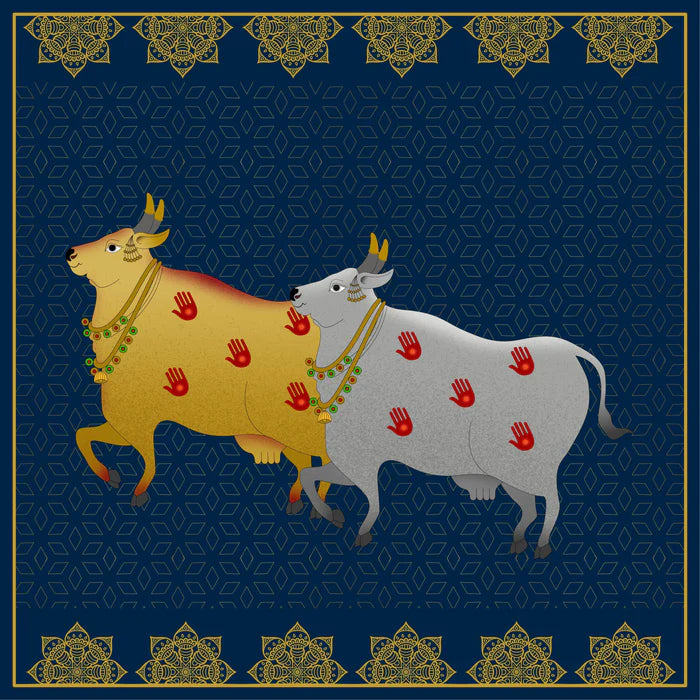The vibrant festival of Navratri, heralding the nine divine nights of Goddess Durga, is upon us! From October 3rd to October 12th, 2024, devotees across India will immerse themselves in prayer, fasting, and celebration. But with so many traditions and rituals, navigating Navratri, especially the fasting aspect, can feel overwhelming. Worry not! This comprehensive guide by Kalakariart.com, the leading online destination for authentic Vastu products like Yantras, paintings, and bracelets, will equip you with all you need to know about Navratri fasting in 2024.
The Significance of Navratri Fasting
Navratri fasting is a period of spiritual purification and devotion to the nine forms of Goddess Durga. By observing restraint in diet and behavior, devotees aim to cleanse their bodies and minds, seeking blessings for prosperity, good health, and victory over inner demons.
Types of Navratri Fasting
There are various ways to observe the Navratri fast, catering to individual preferences and physical limitations. Here's a breakdown of the common practices:
Full Fasting: This involves abstaining from all food and water from sunrise to sunset for the entire nine days. It's recommended for experienced devotees with good health.
Partial Fasting: Devotees can consume specific "falahari" foods (more on that later) during the day and break their fast with a simple meal after sunset.
Sabudana (Sago) Khichdi Fasting: This is a popular option for those who wish to avoid grains but still have a light, nutritious meal during the fast.
Fruit & Milk Fasting: This approach focuses on fresh fruits, nuts, and milk products, providing essential nutrients while maintaining the spirit of the fast.
Navratri Fasting Do's and Don'ts
Do's:
Consume Sattvic Foods: Focus on "falahari" foods like fruits, vegetables, nuts, seeds, kuttu (buckwheat) flour, and sabudana (sago). Cook with sendha namak (rock salt) and healthy oils like ghee or coconut oil.
Stay Hydrated: While some observe a complete water fast, most opt for drinking plenty of water, buttermilk, coconut water, or herbal teas throughout the day.
Maintain Purity: Devotees strive for physical and mental cleanliness. Daily bathing, wearing clean clothes, and practicing positive thoughts are encouraged.
Offer Prayers and Perform Pujas: Dedicate time each day to worshipping the nine forms of Goddess Durga. Chanting mantras, reading scriptures, and lighting diyas are customary practices.
Embrace Positivity: Navratri is a time for introspection and inner peace. Meditate, practice yoga, or engage in activities that uplift your spirit.
Don'ts:
Consume Tamasic Foods: Avoid meat, fish, eggs, onions, garlic, and alcohol. These foods are considered to have a tamasic (impure) quality, hindering spiritual progress.
Engage in Negative Activities: Refrain from gossip, anger, and violence. Cultivate a peaceful and compassionate mindset during the fast.
Overexert Yourself: While maintaining routine activities, avoid strenuous physical exertion that might deplete your energy.
Fast While Unwell: If you're pregnant, menstruating, have medical conditions, or are very young or old, prioritize your health and consult with a doctor before fasting.
Adding a Touch of Vastu to Your Navratri
Vastu Shastra, the ancient Indian science of spatial placement, emphasizes creating a harmonious and positive environment. Here's how you can incorporate
Vastu principles into your Navratri celebrations:
Cleanse Your Puja Space: Declutter and purify the area where you'll perform your pujas. A clean and organized space facilitates a clearer connection with the divine.
Mandala for Positivity: Create a colorful rangoli (mandala) using rice flour or colored powders. Vastu mandalas attract positive energy and enhance the devotional atmosphere.
Light Up Your Home: Diyas and lamps represent the light of knowledge and dispel negativity. Strategically placing them in the northeast direction, considered auspicious in Vastu, can further elevate the energy of your home during Navratri.
Shop for Authentic Vastu Products at Kalakariart.com
Elevate your Navratri experience with genuine Vastu products from Kalakariart.com. From energizing Yantras to serene Vastu paintings and harmonizing bracelets, we offer a curated collection to enhance your spiritual journey. Shop Now from Website Kalakariart.com.
The Significance of Navratri Fasting
Navratri fasting is a period of spiritual purification and devotion to the nine forms of Goddess Durga. By observing restraint in diet and behavior, devotees aim to cleanse their bodies and minds, seeking blessings for prosperity, good health, and victory over inner demons.
Types of Navratri Fasting
There are various ways to observe the Navratri fast, catering to individual preferences and physical limitations. Here's a breakdown of the common practices:
Full Fasting: This involves abstaining from all food and water from sunrise to sunset for the entire nine days. It's recommended for experienced devotees with good health.
Partial Fasting: Devotees can consume specific "falahari" foods (more on that later) during the day and break their fast with a simple meal after sunset.
Sabudana (Sago) Khichdi Fasting: This is a popular option for those who wish to avoid grains but still have a light, nutritious meal during the fast.
Fruit & Milk Fasting: This approach focuses on fresh fruits, nuts, and milk products, providing essential nutrients while maintaining the spirit of the fast.
Navratri Fasting Do's and Don'ts
Do's:
Consume Sattvic Foods: Focus on "falahari" foods like fruits, vegetables, nuts, seeds, kuttu (buckwheat) flour, and sabudana (sago). Cook with sendha namak (rock salt) and healthy oils like ghee or coconut oil.
Stay Hydrated: While some observe a complete water fast, most opt for drinking plenty of water, buttermilk, coconut water, or herbal teas throughout the day.
Maintain Purity: Devotees strive for physical and mental cleanliness. Daily bathing, wearing clean clothes, and practicing positive thoughts are encouraged.
Offer Prayers and Perform Pujas: Dedicate time each day to worshipping the nine forms of Goddess Durga. Chanting mantras, reading scriptures, and lighting diyas are customary practices.
Embrace Positivity: Navratri is a time for introspection and inner peace. Meditate, practice yoga, or engage in activities that uplift your spirit.
Don'ts:
Consume Tamasic Foods: Avoid meat, fish, eggs, onions, garlic, and alcohol. These foods are considered to have a tamasic (impure) quality, hindering spiritual progress.
Engage in Negative Activities: Refrain from gossip, anger, and violence. Cultivate a peaceful and compassionate mindset during the fast.
Overexert Yourself: While maintaining routine activities, avoid strenuous physical exertion that might deplete your energy.
Fast While Unwell: If you're pregnant, menstruating, have medical conditions, or are very young or old, prioritize your health and consult with a doctor before fasting.
Adding a Touch of Vastu to Your Navratri
Vastu Shastra, the ancient Indian science of spatial placement, emphasizes creating a harmonious and positive environment. Here's how you can incorporate
Vastu principles into your Navratri celebrations:
Cleanse Your Puja Space: Declutter and purify the area where you'll perform your pujas. A clean and organized space facilitates a clearer connection with the divine.
Mandala for Positivity: Create a colorful rangoli (mandala) using rice flour or colored powders. Vastu mandalas attract positive energy and enhance the devotional atmosphere.
Light Up Your Home: Diyas and lamps represent the light of knowledge and dispel negativity. Strategically placing them in the northeast direction, considered auspicious in Vastu, can further elevate the energy of your home during Navratri.
Shop for Authentic Vastu Products at Kalakariart.com
Elevate your Navratri experience with genuine Vastu products from Kalakariart.com. From energizing Yantras to serene Vastu paintings and harmonizing bracelets, we offer a curated collection to enhance your spiritual journey. Shop Now from Website Kalakariart.com.





Leave a comment
This site is protected by hCaptcha and the hCaptcha Privacy Policy and Terms of Service apply.